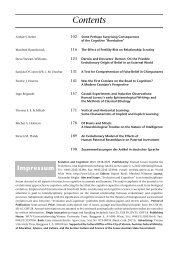The Seven Sins of Evolutionary Psychology - Konrad Lorenz Institute
The Seven Sins of Evolutionary Psychology - Konrad Lorenz Institute
The Seven Sins of Evolutionary Psychology - Konrad Lorenz Institute
You also want an ePaper? Increase the reach of your titles
YUMPU automatically turns print PDFs into web optimized ePapers that Google loves.
Chris MacDonaldand… the goods <strong>of</strong> different persons are not parts <strong>of</strong>a single, overall good”. Note that to hold that valueis individualistic in this sense does not imply eitherethical or psychological egoism; that is, it does notimply that individuals care only about their ownwell-being. As GAUTHIER puts it, “A state <strong>of</strong> affairsthat is good for a single individual is then good fromthe standpoint <strong>of</strong> each person who prefers or wouldprefer the enhancement <strong>of</strong> that individual’s well-being”(p51). (Nor does understanding value as relativenecessarily lead to ethical relativism. Moral rulesmay be shared, even if we differ in our attributions<strong>of</strong> value.) In opposition to the relative conception <strong>of</strong>value is the absolutist conception, which holds, accordingto GAUTHIER that “…values are the same forall persons, or for all sentient beings” (p50). <strong>The</strong> conception<strong>of</strong> value as relative fits nicely with the competitiveframework <strong>of</strong> evolutionary theory, accordingto which individuals may value the welfare <strong>of</strong>others, but only contingently.As noted above, most modern moral theories areat odds with this subjective and relative theory <strong>of</strong>value. Utilitarianism, for example, makes the claimthat the happiness <strong>of</strong> any given individual is a goodthing simpliciter; that is, it is to be regarded as a goodby every rational being. Thus for Utilitarians, valueis subjective but also absolute. KANTIANS, for theirpart, hold that the respect due to all rational agentsfinds its source in their inherent value. <strong>The</strong> KANTIANtheory <strong>of</strong> value must then be both objective (since itmakes no mention <strong>of</strong> anyone’s preferences or affectivestates) and absolute (since it holds rationalagents to have value for everyone). For a fuller defence<strong>of</strong> the individualist theory that takes value insteadto be both subjective and relative, I refer thereader to GAUTHIER (1986)’s Chapter II section 4.3. <strong>Evolutionary</strong> <strong>Psychology</strong>How can we tell whether a given rule or standard isconsistent with our moral psychology? Empiricalinvestigation—trial and error—is one way. 6 But evolutionaryconsiderations can be useful in guidingour empirical investigations. Thus one set <strong>of</strong> methodsthat can be used to study the psychologicalmechanisms behind our moral behaviour is that <strong>of</strong>evolutionary psychology. 7<strong>Evolutionary</strong> psychology is predicated on the ideathat, contrary to the beliefs <strong>of</strong> behaviourists such asPAVLOV and SKINNER, the human mind is anythingbut a blank slate. Rather than seeing it as a generalpurposecomputational device, evolutionary psychologistssee the mind as a collection <strong>of</strong> specialpurposealgorithms, each designed (in the metaphoricalsense 8 ) to solve a particular problem facedduring our evolutionary history.According to evolutionary psychologists, evolutionhas given us certain cognitive capacities (suchas the ability to detect aggression in others, or theability to remember wrongs) and emotional dispositions(such as the capacity for sympathy and spite)that factor significantly in our moral lives. Investigation<strong>of</strong> these capacities and dispositions can be informedby evolutionary theory. Knowledge <strong>of</strong> thesorts <strong>of</strong> problems that the human brain evolved tosolve can lead to hypotheses concerning what sorts<strong>of</strong> particular cognitive mechanisms and predispositionswe can expect to be included in our psychologicalmakeup. Such hypotheses can be tested againstanthropological data and against psychological evaluation<strong>of</strong> test subjects. We can then evaluate particularmoral standards in terms <strong>of</strong> the degree to whichthey are compatible with known capacities and dispositions.In applying this test, I am proposing theuse <strong>of</strong> an evolutionary perspective to investigate humannature. <strong>The</strong>re is nothing novel about wantingto look at human nature in designing moral systems.<strong>The</strong> idea here is that our shared nature places limitson what we can learn to do—on how we can learn tobehave. <strong>The</strong> novelty, <strong>of</strong> course (at least for philosophers)lies in looking to evolutionary theory for abetter understanding <strong>of</strong> that nature.3.1 Cognitive capacitiesWhat sorts <strong>of</strong> limits on moral behaviour might beseen in our shared, evolved nature? As one example,COSMIDES and TOOBY (1992) find compelling evidencefor a special human aptitude for detectingcheating in situations <strong>of</strong> social exchange. Similarstudies might just as easily find that humans are particularlyinept at a particular kind <strong>of</strong> reasoning.Given such knowledge, it would seem foolish (froman instrumentalist point <strong>of</strong> view) to propose a moralstandard that ignored our aptitudes while relyingheavily on forms <strong>of</strong> reasoning at which we generallydo badly.For example, it might one day be discovered thathumans lack the aptitude for categorical reasoning<strong>of</strong> the sort demanded <strong>of</strong> us by KANT. That is, it mightturn out, upon empirical investigation, that humansare relatively inept at figuring out whether, ina particular case, the maxim by which one acts isone “which [one] can at the same time will that itshould become a universal law” (KANT 1959, p39). Ifsuch a hypothesis about our cognitive capacitiesEvolution and Cognition ❘ 100 ❘ 2001, Vol. 7, No. 1








